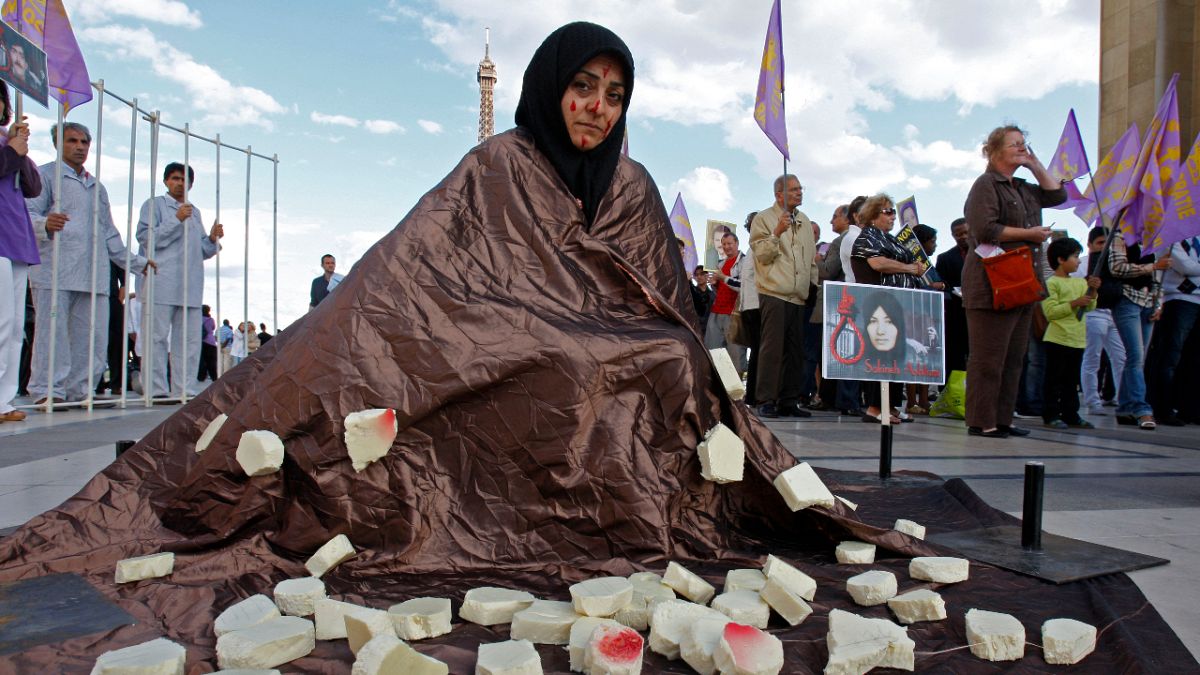Amnesty International recorded 483 executions across 18 countries during 2020 - a drop of 26% compared to the previous year.
The number of death sentence executions recorded around the world by Amnesty International during 2020 fell by a quarter compared to 2019, the human rights organisation has reported.
In a 63-page report on death sentences and executions in 2020, Amnesty said it recorded 483 executions across 18 countries over the course of last year, representing a record low.
Despite marking "a shocking loss of life, with many executed after grossly unfair trials," Amnesty welcomed the news of a 26% drop in executions compared to 2019, during which 657 executions were recorded.
"We recorded the lowest year in at least decade," Chiara Sangiorgio, Amnesty International’s advisor on the death penalty, told Euronews in a phone interview on Wednesday.
Noting that the drop represents a 70% decline from 2015, during which Amnesty recorded a peak of 1,634 executions, Sangiorgio said she believed the fall represents "more sustained changes and long-term progress" in nations around the world.
The most striking drop in executions, Amnesty said, occurred in Saudi Arabia where death sentences executed plunged by 85 per cent from 184 in 2019 to just 27 in 2020.
In Iraq, however, executions were more than halved from 100 in 2019 to 45 last year.
Meanwhile, the organisation said "no executions were recorded in Bahrain, Belarus, Japan, Pakistan, Singapore or Sudan - all countries which executed prisoners in 2019".
'Coronavirus pandemic partly behind drop'
Sangiorgio said that some of the decline in executions could be attributed to delays caused by the coronavirus pandemic.
"Certainly, the pandemic has an effect," she said. However, she said that much of the fall appeared to be due to a more "long-term" trend of reducing executions.
"We hope that 2021 will not be the year where we see all this progress that we saw for a long time, but also as an effect of COVID, get undone," she said.
In a statement provided by Amnesty International, Agnès Callamard, the organisation's secretary-general, said it should still be a concern that countries continued to pursue executions, even in the midst of a pandemic.
“As the world focused on finding ways to protect lives from COVID-19, several governments showed a disturbing determination to resort to the death penalty and execute people no matter what," Callamard said.
“The death penalty is an abhorrent punishment and pursuing executions in the middle of a pandemic further highlights its inherent cruelty," she asserted.
“Fighting against an execution is hard at the best of times, but the pandemic meant that many people on death row were unable to access in-person legal representation, and many of those wanting to provide support had to expose themselves to considerable - yet absolutely avoidable - health risks," Callamard said, adding: "The use of the death penalty under these conditions is a particularly egregious assault on human rights."
'Thousands' of cases concealed
Amnesty International also stressed that its figures represent "only minimum known" cases, with some countries concealing death penalty data or only providing limited information.
Chinese authorities, for example, consider information on the executions and death sentencing in the country a "state secret", Amnesty said.
As a result, the organisation's reports do not include data from China. However, Amnesty said in a briefing on its report: "China is believed to execute thousands of people each year, meaning that last year it will have been - once again - the world’s most prolific user of capital punishment".
Iran is believed to be second to China, with at least 246 executions, followed by Egypt (at least 107), Iraq (at least 45) and Saudi Arabia (27).
"Between them, Iran, Egypt, Iraq and Saudi Arabia accounted for the vast majority (88%) of all known executions during 2020," the organisation said.
In the USA, the only country in America to carry out known executions in 2020, federal executions were resumed under former President Donald Trump after a 17-year-long gap.
The resumption of executions saw ten people put to death in quick succession in under six months.
Meanwhile, countries including India, Qatar, Taiwan and Oman also resumed executions.
Overall, Amnesty's report recorded the following executions in 2020, with the numbers representing the minimum known cases:
- China: Believed to be in the thousands
- Iran: 246
- Egypt: 107
- Iraq: 45
- Saudi Arabia: 27
- USA: 17
- Somalia: 11
- Yemen: 5
- India: 4
- Oman: 4
- Botswana: 3
- South Sudan: 2
- Sudan: 2
- Bangladesh: 2
- Qatar: 1
- Taiwan: 1
- North Korea: Unknown
- Syria: Unknown
- Vietnam: Unknown
'Positive' overall picture
In her statement, Callamard said that "despite the continued pursuit of the death penalty by some governments, the overall picture in 2020 was positive".
“We urge leaders in all countries that have not yet repealed this punishment to make 2021 the year that they end state-sanctioned killings for good," she said.
Until then, she said Amnesty would "continue to campaign until the death penalty is abolished everywhere, once and for all".
